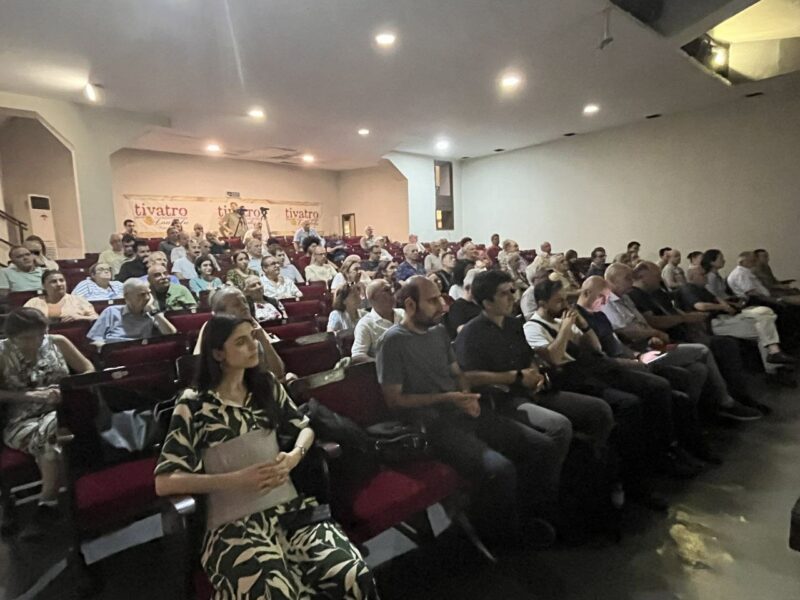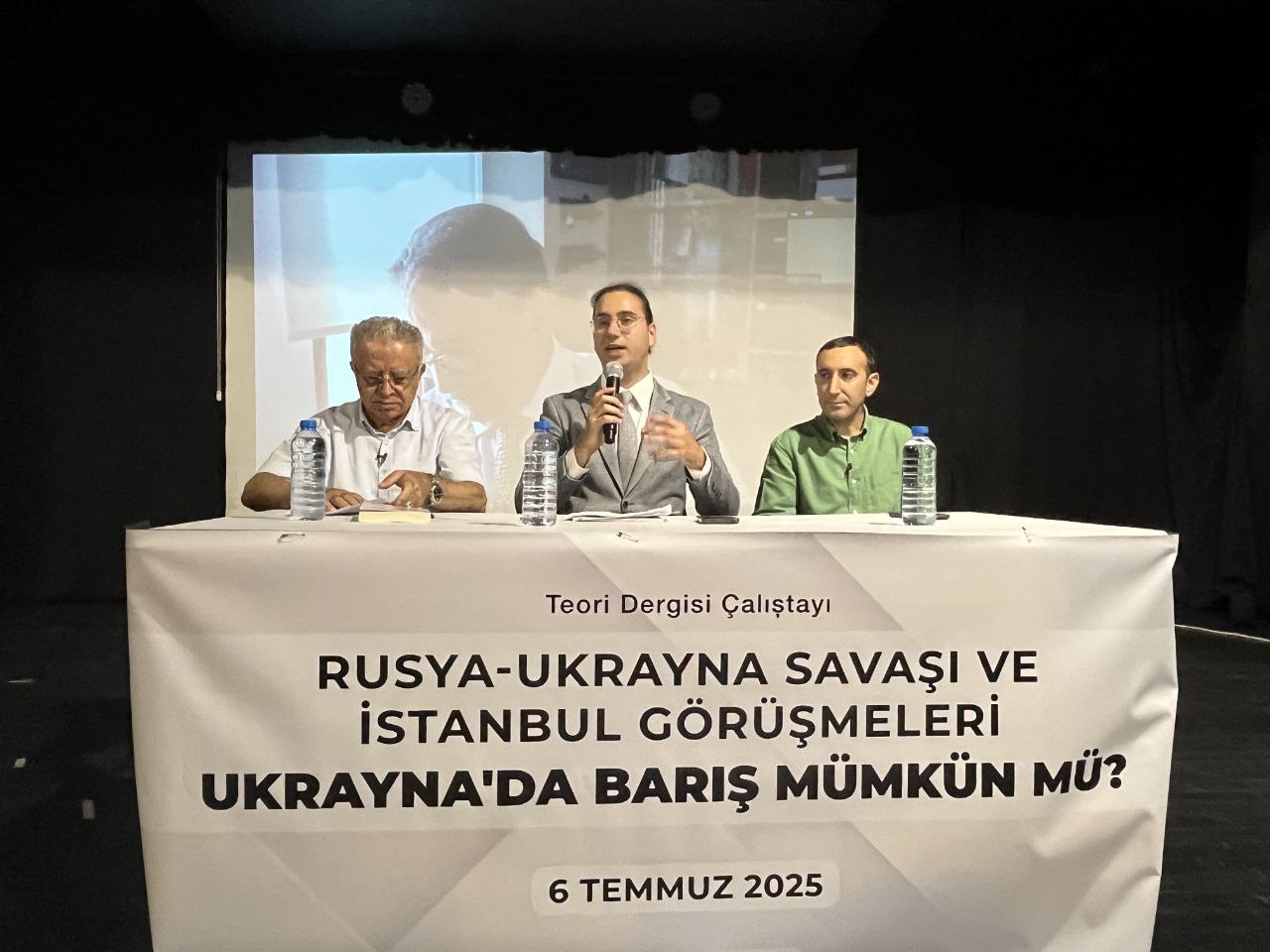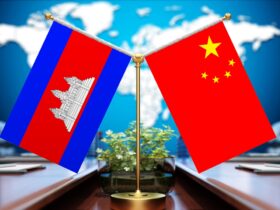On Sunday, July 6, Theory magazine held a workshop titled “Russia–Ukraine War and the Istanbul Talks: Is Peace Possible in Ukraine?”
On Sunday, July 6, Theory magazine held a workshop titled “Russia–Ukraine War and the Istanbul Talks: Is Peace Possible in Ukraine?”
As the Russia–Ukraine war continues with no end in sight, Türkiye’s role as a potential mediator is again in focus. On Sunday, July 6, Theory magazine held a workshop titled “Russia–Ukraine War and the Istanbul Talks: Is Peace Possible in Ukraine?” at the Aksaray Su Theater. The three-hour event brought together 120 participants, including retired military officers, journalists, and political analysts, and featured speeches, presentations, and a public Q&A session.

The real front: the Atlantic vs. Eurasia
Speakers highlighted Türkiye’s constructive involvement in the 2022 Istanbul negotiations between Russia and Ukraine, characterizing the talks as a promising initiative that was ultimately sabotaged by Western powers. They stressed that renewed interference must not be allowed and warned that continued arms shipments by NATO countries have only fueled escalation. With regional stability hanging in the balance, participants called for the immediate revival of diplomatic efforts, centered once again in Istanbul.
Several speakers underscored that the war stems from unaddressed Russian security concerns, and that any meaningful resolution must confront the strategic expansionism of the Atlantic alliance. The consensus was that Ukraine functions as a proxy base for the West in its campaign to encircle and contain Russia and, by extension, the wider Eurasian sphere. The rapid militarization of Europe, they warned, is part of this broader polarization. The idea of restoring long-term political and economic cooperation between Türkiye and Russia was presented as both realistic and essential.
Militarization for profit
Retired Rear Admiral Deniz Kutluk highlighted the financial engine behind the war. With the U.S. cutting military aid to Ukraine, Europe has stepped in despite lacking the industrial or economic capacity for sustained support. “If NATO members increase defense spending by just 1%, that’s $6 trillion. The U.S. takes 70% of it. Europe is uneasy and wants to strengthen its own defense sector,” he noted. “They say, ‘If America won’t back Ukraine, we will, so the war goes on.’ But Europe can’t sustain this. Meanwhile, the U.S. arms industry has been revived.”
Kutluk also commented on the peace talks: “Zelenskyy and his European backers are chasing a fantasy. Time is working against Ukraine. Russia demands the removal of foreign forces from Ukrainian territory and firmly opposes Ukrainian nuclear armament. A long-term peace isn’t anywhere on the horizon.”
How NATO brought Ukraine to the brink
Retired Air Force Colonel İhsan Sefa traced the roots of the conflict to 2013, when Ukraine’s president rejected an EU agreement, triggering a Western-backed uprising. “A government was toppled in 2014, Crimea rejoined Russia via referendum, and then came a campaign of violence against Russian-speaking regions,” he said.
“Neo-Nazi groups were deployed into Russian-majority areas. Around 14,000 civilians were killed. What Turks lived through in Cyprus, Russians lived in Donetsk and Luhansk. Russia always opposed NATO expansion. If Ukraine joined, Russia would be surrounded via the Black Sea. Now, Russia controls most of Ukraine’s Black Sea coast. Strategic objectives have been achieved regardless of casualties. Europe sanctioned Russian gas, only to become dependent on overpriced American shale gas.”
The war serves U.S. interests
Sefa emphasized that the biggest winner is the United States: “It revitalized NATO, its defense sector, and secured $120 billion in arms sales to Europe. NATO countries were forced to allocate 5% of their GDP to defense. Türkiye spent 30% of its national share to protect Europe and lost its development path.”
“The U.S. wanted this war. It profits by fueling conflict and selling weapons. It has seized Ukraine’s mineral wealth. Russia got the land, the U.S. got what’s underneath. The war will end only when Washington wants it. Zelenskyy won’t be able to meet their demands.”
Sefa also warned about NATO infrastructure in Türkiye: “The Kürecik radar doesn’t protect us. A missile from the East gets detected, the data goes to Rammstein in Germany, then to a NATO base in Romania. That system can’t stop a missile from hitting Istanbul.”
Aydinlik’s role in the war
Aydınlık newspaper editor-in-chief Tevfik Kadan traced the current confrontation back to Cold War geopolitics. “Sea power triumphed over land. The Soviet Union fell. But the Russian core survived. That’s what Europe doesn’t grasp. Civilizational nations like Turks and Russians always rebuild because their historical development runs deep.”
Kadan pointed to a global realignment: “We’re entering a new era. The U.S. is split between realists and globalists. Türkiye’s natural allies are countries like China, Iran, and Russia. The war won’t fully end because Russia won’t allow Western containment strategies to succeed.”
He also referred to a series of intelligence reports published in Aydınlık: “We’ve been exposing Ukrainian intelligence operations against pro-Russian Tatars, and hiding a nuclear leak from international authorities. The Ukrainian people are diligent and productive. But they do not deserve their current leadership.”

















Leave a Reply